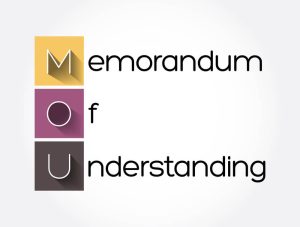Memorandum of Understanding as a Tool for Divorce Mediation in New Jersey
A memorandum of understanding allows divorcing parties to express their goals and expectations of one another after undergoing mediation.

In this article, our experienced New Jersey divorce lawyers will discuss the purpose and function of an MOU, as well as the process of creating one and making it legally binding and enforceable. With vast experience assisting clients through the mediation process, reaching favorable agreements in divorce cases, and meticulously reviewing and crafting agreements that can be enforced to protect our clients’ future interests in a court of law should the need arise, our divorce attorneys at The Montanari Law Group are here to assist you with your case. To discuss your situation with a member of our team, we encourage you to contact us today at (973) 233-4396.
Memorandum of Understanding (MOU): A Non-Binding Agreement in Divorce Mediation
A Memorandum of Understanding (MOU) is a non-binding document that recites and memorializes the intentions, expectations, and obligations of the parties involved. In the context of a divorce mediation, an MOU will be created after the completion of the mediation process, which typically involves several mediation sessions with the spouses, their attorneys, and a mediator.
In a divorce, mediation can take place at a few different stages. Some couples go through mediation before they even file for divorce. During the mediation, the spouses will discuss and, hopefully, agree on how they will handle property division, alimony (spousal support), child custody, visitation, a co-parenting plan, and child support. At the end of the mediation process, all of the decisions made by the parties will be memorialized in a document, an MOU, by the mediator, which the parties can revise until it accurately describes the agreement and understanding between them.
This agreement is non-binding, which means that it simply describes the parties understanding, intentions, and agreement, but it is not enforceable in a court of law until a judge uses this agreement to form the basis of a judicial order. Then, the judge’s order, which reflects the parties agreement, is legally binding and enforceable.
Benefits for the Parties of a MOU in a NJ Divorce Mediation
Even though an MOU is not binding on the parties, it can be useful in two main ways.
First, the parties can choose to take the MOU and apply it themselves. An MOU can be utilized by spouses who have separated legally or informally, as well as those involved in a divorce. Former spouse may also choose to seek mediation of issues that arise due to conflict or changed circumstances after a divorce decree has been issued. In this way, the MOU serves as a roadmap for the parties’ relationship and how they will handle different issues relating to their divorce, property, finances, and children. However, if the parties wish to make any changes to matters covered in the divorce decree or another court order, they must petition the court to make those changes.
The parties can also take their agreement and present it to the court to obtain a formal order from the judge. The agreement between the spouses on certain issues may become part of their divorce decree. The advantage to mediating the issues and creating an MOU before going to court is that the process is generally much more amicable, efficient, and cost-effective. It also provides a unique environment for the parties to express their concerns, desires, and points of view to one another.
Making a Memorandum of Understanding Enforceable in Court
The reason that the parties may wish to present their MOU to the court for an order is to make the agreement enforceable by the court. Without this court order, which may be within the divorce decree itself or in a separate order, one party cannot legally enforce the agreement on the other spouse if they violate the terms of the agreement. An MOU may also be created as a result of court-mandated mediation, which often relate to issues of child custody and visitation. In some cases, couples may find themselves in court-mandated mediation to resolve issues relating to property division. If the parties are not in agreement about their parenting plan and child support, the court will nearly always order the couple to go through mediation in an attempt to resolve these issues.
It is important for the parties to produce the MOU after going through mediation, so the judge can incorporate the terms of their agreement into their order. Even though an MOU itself is not a legally binding and enforceable agreement, it will become so once the parties submit the MOU to the court and the judge issues an order based on this document. Therefore, it is crucial that you understand your rights and how each decision and agreement you make during mediation will impact you legally and financially.
Who can Play a Role in Reaching an MOU?

Even if your mediator is a lawyer, New Jersey law prohibits the mediator from representing you and your spouse. Therefore, to receive the legal advice you really need in order to make the best decisions financially and legally for you and your family, you should have your own attorney present, representing you, advocating for you, and guiding you through the process. This guidance is indispensable throughout the negotiation and drafting process.
Once an MOU is drafted, your attorney should review it and request any changes that are in your interest. Then, your attorney will present the MOU to the court and help you to resolve any remaining issues to finalize your divorce through a marital settlement agreement.
A Divorce Lawyer at Montanari Law Group Can Assist with Your Memorandum of Understanding in New Jersey
If you are thinking about filing for divorce or are in the early stages of a divorce proceeding, it is wise to recognize the value of having a skilled and knowledgeable divorce attorney by your side throughout the mediation process and court proceedings.
Our team of family law attorneys at The Montanari Law Group would be happy to assist you with every aspect of your divorce case, as we have done for clients in Elmwood Park, Jersey City, Passaic, Verona, Nutley, Woodland Park, Caldwell, West Milford, and throughout Northern New Jersey. In our practice, we address each divorce case and each client as a unique entity, requiring a depth of understanding of the individual’s needs and goals, as well as our depth of understanding of New Jersey divorce and family law, to craft the best possible solutions.
Contact us at (973) 233-4396 if you have questions regarding divorce strategies, key elements and documents, and how we can play a role in best preserving your future and long-term goals. A lawyer on our staff is available to provide you with more information and a free consultation.
